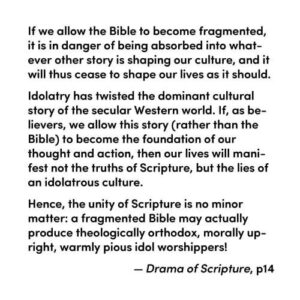
 A recent trend I’ve seen which greatly disturbs me — even angers me, at times — is a tendency for Christian believers to divide themselves from one other according to their pet doctrines. This is much like the old East-Indian parable of the blind men and the elephant:
A recent trend I’ve seen which greatly disturbs me — even angers me, at times — is a tendency for Christian believers to divide themselves from one other according to their pet doctrines. This is much like the old East-Indian parable of the blind men and the elephant:
Five blind men heard an elephant had been brought into town and none of them knew anything about the animals. They agreed that since they couldn’t see, they needed to go to the elephant and determine its characteristics by touch.
The first man encountered the elephant’s trunk and observed the elephant was like a drain pipe. The second man touched the elephant’s ear and determined an elephant was much like a fan. The third man found the animal’s tail and thought an elephant resembled a rope. Another of his partners bumped into the elephant’s leg and immediately concluded that the elephant was like a tree. The final blind man sat on the elephant’s back and decided that an elephant is rather like a throne.
They then had a huge argument over what elephants were like, each thinking his comrades were wrong when, in reality, all of them were right.
Now admittedly, this parable is used by Hindu’s to teach moral relativism, but there is an alternate interpretation to the story: only the immature will be so unteachable that they divide themselves from their brothers and sisters over topics where they do not have all the facts.
This appears to be the state of the Body of Christ at this moment in history.
In my mind’s eye, I can see Satan nodding with a satisfied smirk on his face because we are so busy fighting one another that we are neglecting fighting him, our only true enemy (see Ephesians 6:12). With that same eye, I can see Jesus shaking His head in sorrow. His words stating the world would know us by our love for one another have somehow gotten lost in our priorities.
A Fragmented Gospel
 We have fragmented “the elephant” aka the Gospel of Christ into pieces that pander to our self-righteousness. The chunks that we find palatable because it agrees with our personal opinions and religious backgrounds, we hold up as the only Truth. Those chunks we disagree with or are presented by ministers who offend us in some way or another or are contrary to our religious traditions, we attack and call heretical.
We have fragmented “the elephant” aka the Gospel of Christ into pieces that pander to our self-righteousness. The chunks that we find palatable because it agrees with our personal opinions and religious backgrounds, we hold up as the only Truth. Those chunks we disagree with or are presented by ministers who offend us in some way or another or are contrary to our religious traditions, we attack and call heretical.
As a result, we have dismissive, divisive terminology and definitions for those aspects some of us don’t care for, such as “the health and wealth gospel” and “the affirmation gospel” and “the therapeutic gospel,” just to name three. Ministers who teach along those lines and the believers who agree with those teachings are maligned as charlatans, heretics, and worse. The members of those three groups are often just as guilty, responding to those who disagree with them as somehow second-class believers.
We defend such behavior by claiming we are protecting those who are weak in the faith and/or the unsaved from false doctrines (as if the Holy Spirit is incapable of protecting His sheep. Seriously?).
Who do we think we are, elevating ourselves to some imaginary moral high ground, usurping the judgment seat of the Most High, and declaring our brothers and sisters for whom Jesus dearly paid with His precious blood as somehow “less-than” simply because they have the temerity to accept a piece of the elephant we don’t care for?
There Can Be Only One — Gospel, That Is!
Jesus suffered horrendous torture and died an excruciating death to provide us with the entire elephant, not just the parts we happen to like, or were raised with, or were believed by Aunt Bucketmouth, or were taught about in seminaries. The tragic fact of the matter is that when we fragment His Gospel, we cut off precious saints for whom Christ died from entire areas of God’s grace.
There are no valid theological constructs as “the whatever gospel” where “whatever” is any adjective used to label some aspect of biblical teaching that we disagree with. There is only “the Gospel” singular — and unadulterated/unqualified/unlimited by the doctrinal preferences of mere men/women, no matter how learned or publicly renowned they may be.
As virtually all of you already know, the word “Gospel” means “Good News.” The Greek word for “Gospel” in the Bible is euangelion. Euangelion was a political term used during the Roman Empire and it always indicated a regime change. In other words, when an emperor died and his successor ascended to the throne, a euangelion was published throughout the Empire declaring, “Good news! We have a new emperor and his name is Nogrippa!” This impacted not only the politics at that time, but also their pagan worship — because the emperor was regarded as a god — and the commerce that surrounded such.
In other words, it impacted every aspect of a citizen’s life! The temples dedicated to worshipping the old emperor would be repurposed and a statue of the new ruler would replace his predecessor. All members of the empire would swear allegiance to the new regime/temple by proclaiming, “Emperor Nogrippa is lord!”
So when Jesus and the apostles preached the euangelion of the kingdom of God, they were declaring the advent of a new spiritual and eternal king over a kingdom superseding any realm found on this earth. The confession that saves us — Jesus is Lord! — is our declaration that He is our King and we are pledging our allegiance, devotion, worship, and obedience to Him. This concept is consistent throughout the NT.
A Comprehensive Redemption
One aspect of the Gospel of Christ which seems to escape many is that God didn’t do anything by halves when He designed Jesus’ atonement. Admittedly, if the only thing Jesus ever accomplished was dying for our sins so that we could go to heaven, that would have been far, FAR above anything we could ever imagine or deserve!
But, according to the New Testament, God didn’t stop with salvation. In other words, Jesus didn’t limit Himself to dying only for our sins — He died to completely “reverse the curse” and redeem us from ALL the aftermath of Adam’s rebellion! So let’s explore that a bit:
- What would be Good News to a person who has been totally degraded and devalued through verbal and/or physical and/or sexual and/or religious abuse, who has been told that he/she is worthless and will never be anything but an abject failure? That God loves you and is on your side, that He values you beyond our ability to comprehend, that He thinks you are incredibly special and awesome sound about right? Gasp! OMG! That sounds a LOT like that terrible, heretical affirmation gospel! Horror of horrors! Somebody get a rope and string ’em up!
- What would be Good News to an addict (pick any substance or behavior), whose life is in the toilet, having lost his/her spouse, children, career, home, self-respect, dignity, because he or she just cannot get free from that bondage? Wouldn’t something that sounded like Jesus being on your side, that He died to set us free from the bondage of our sin, that He has made a way where there seems to be no way for you to get free from that and that He wants to restore your life to so-called normalcy? Quick! Call the heresy police! Someone is preaching that horrendous therapeutic gospel!
- What would be Good News to someone who suffers from some chronic illness (such as the woman who had suffered from female problems for a dozen years and touched the hem of Jesus’ robe) and cannot provide for his/her family or fulfill a ministry calling? Pardon me, but wouldn’t “by His stripes we are healed” and a host of other promises concerning divine healing and health be Good News to such people? Eeeewww! That bogus healing gospel! Heresy! Cast them out from among us!
- What would be Good News to a homeless person living in abject poverty, who doesn’t have two nickels to rub together and is living in a car or a cardboard box, the children are constantly hungry and the only food they have to eat is after they stand line for hours in the cold/heat outside a shelter or soup kitchen? Might that Good News be that Jesus — along with all our past, present, and future sins — bore the curse of poverty at the Cross and that He is Jehovah-Jireh, the God Who Sees and Provides? But that would be that carnal prosperity gospel preached by venal televangelists who only want our money so they can live in mansions and fly in private jets! Quick! There’s a post! Tie those heretics up to it and pile up the wood around them! Burn those heretics!
There is an old adage that says “a man with an argument is no match for a man with an experience.” Say what you will, but I have experienced the Truth of these doctrines over the course of my life.
- Over the years, I have been healed of several medical conditions — up to and including cancer — by both supernatural and medical means.
- By the grace of God, I am free from a debilitating addiction which had plagued me from a very early age.
- I have overcome bitterness, deep-seated self-hatred, and crippling self-doubts caused by a childhood and adolescence filled with bullying, rejection, and verbal abuse.
- After two brushes with homelessness (the most recent was only 15 years ago; His grace is the only reason I’m not living in a cardboard box or under an overpass somewhere to this day!), I now live in the biggest, nicest house I’ve ever owned (is it a mansion? Not hardly!), drive the nicest, most luxurious, most powerful car I’ve ever owned (is it a Rolls-Royce? Not even close!), and I am working at the longest-term job I have ever held (am I a multimillionaire CEO? Not on this planet!).
How did all this come to pass? Ridiculously easy to describe, far more difficult to live through: revelation from God’s Word and His grace and His mercy and His lovingkindness and His patience and His generosity and His wisdom and His Body despite my legions of terrible choices and frequent bad attitudes. I did nothing to earn, deserve, or otherwise qualify for these blessings — they came to me by grace and grace alone!
Paraphrasing the testimony of the blind man Jesus healed in John 9:
“Debate theology all you want. This I do know: though I was sick, now I’m healed; though I was impoverished, now I prosper; though I was rejected, now I am accepted; though I was in bondage, now I am free!”
I have no “good old days” to look back upon with fond nostalgia — I am living the best days of my life as I write this! That does not imply I am exempt from life challenges needing to be overcome by faith in God’s Word empowered by His grace, love, and mercy. Jesus promised us we would always have troubles and tribulations in this world which would be incredibly depressing if that was where He left it.
But He didn’t!
In the very next breath, He assures us of victory in this life and that we should rejoice because of that fact (John 16:33). I can face the challenges life throws my way because God is good, God is faithful, He honors all His promises all of the time, and He has a rich and varied track record of being and doing precisely that in my life for over 40 years and counting!
Unity of the Faith
Paul dealt with the issue of church unity in one of his letters to the church at Corinth:
For as the body is one and has many members, but all the members of that one body, being many, are one body, so also is Christ. For by one Spirit we were all baptized into one body — whether Jews or Greeks, whether slaves or free — and have all been made to drink into one Spirit. For in fact the body is not one member but many…But now God has set the members, each one of them, in the body just as He pleased.
And if they were all one member, where would the body be? But now indeed there are many members, yet one body. And the eye cannot say to the hand, “I have no need of you;” nor again the head to the feet, “I have no need of you.” No, much rather, those members of the body which seem to be weaker are necessary. And those members of the body which we think to be less honorable, on these we bestow greater honor; and our unpresentable parts have greater modesty, but our presentable parts have no need.
But God composed the body, having given greater honor to that part which lacks it, that there should be no schism in the body, but that the members should have the same care for one another. And if one member suffers, all the members suffer with it; or if one member is honored, all the members rejoice with it. Now you are the body of Christ, and members individually.
1 Corinthians 12:12-14,20-27
If the Body of Christ was a real human body on this earth, the doctors would diagnose it as suffering from a combination of Tourette’s Syndrome (parts of the Body acting and speaking out without self-control) and a terminal auto-immune disorder where the parts of the body designed to protect it have turned on the rest of the body and are attacking them, making them sick and dysfunctional.
Why is this happening? Paul describes the prime reasons earlier in that same letter:
And I, brethren, could not speak to you as to spiritual people but as to carnal, as to babes in Christ. I fed you with milk and not with solid food; for until now you were not able to receive it, and even now you are still not able; for you are still carnal. For where there are envy, strife, and divisions among you, are you not carnal and behaving like mere men? 1 Corinthians 3:1-3 (emphasis mine)
- carnal (sarkikos)
- having the nature of flesh, i.e. under the control of the animal appetites; governed by mere human nature not by the Spirit of God; having its seat in the animal nature or aroused by the animal nature
I feel one of the most damning terms is the the phrase “mere men.” While the word “mere” is not actually present in the original Greek text, it is strongly implied by the context. Weymouth translates this term as “living and acting like mere men of the world.” Young’s Literal Translation says, “are ye not fleshly, and in the manner of men do walk?”
Obviously, God clearly expects more from His Holy-Spirit-inhabited children than what the vast majority of us are delivering! And we shake our heads in amazement, wondering why the lost are not flocking to our churches in droves.
Loving The Brethren
In chapters 13-17 of John’s Gospel, we find Jesus’ farewell address to His disciples. Even though, the disciples are still clueless as to what is about to transpire, Jesus knew His own arrest, trial, and execution were going to take place within 24 hours. The topics He covers in these 5 chapters are the summation of His earthly ministry and He was using these last moments to communicate that which was most important and crucial to His followers. While all the verses in these chapters have value, of course, I’m going to highlight those applicable to our discussion here. We’ll start with Jesus’ words shortly after washing the disciples’ feet:
A new commandment I give to you, that you love one another; as I have loved you, that you also love one another. By this, all will know that you are My disciples, if you have love for one another.
John 13:34-35
But I thought it said, “By this, all will know that you are My disciples, if you have the correct doctrinal position.”
[LOUD BUZZER] Sorry, wrong answer! Please try once again!“By this, all will know that you are My disciples, if you publicly condemn those who disagree with your interpretation of Scripture.”
[LOUD BUZZER] Sorry, wrong answer! Thank you again for playing!Nope, it doesn’t say anything remotely like that, does it?
Christianity spread like wildfire throughout the Roman Empire during the first 300 years of its existence because of those early believers’ no-holds-barred, self-sacrificing, daily-laying-their-lives-on-the-line agape love that Jesus commanded in John 13 and Paul described so eloquently in his first letter to the Church at Corinth:
Love suffers long and is kind; love does not envy; love does not parade itself, is not puffed up; does not behave rudely, does not seek its own, is not provoked, thinks no evil; does not rejoice in iniquity, but rejoices in the truth; bears all things, believes all things, hopes all things, endures all things.
1 Corinthians 13:4-7
As Jesus’ continues His final discourse in John 14, we find the following verses:
“If you love Me, keep My commandments…He who has My commandments and keeps them, it is he who loves Me. And he who loves Me will be loved by My Father, and I will love him and manifest Myself to him.” Judas (not Iscariot) said to Him, “Lord, how is it that You will manifest Yourself to us, and not to the world?” Jesus answered and said to him, “If anyone loves Me, he will keep My Word; and My Father will love him, and We will come to him and make our home with him. He who does not love Me does not keep My words; and the Word which you hear is not Mine but the Father’s who sent Me.
John 14:15,21-24
Here, we hit a rubber-meets-the-road, come-to-Jesus moment. Just a few verses after Jesus commanded — not suggested — that we love one another, He then goes on to equate our level of obedience with how much we love Him. Thank God for His grace, because we fall so terribly short in being obedient, especially when it comes to dealing with those pesky folks who disagree with us doctrinally! He returns to this thought a a few sentences later:
As the Father loved Me, I also have loved you; abide in My love. If you keep My commandments, you will abide in My love, just as I have kept My Father’s commandments and abide in His love. These things I have spoken to you, that My joy may remain in you, and that your joy may be full. This is My commandment, that you love one another as I have loved you. Greater love has no one than this, than to lay down one’s life for his friends. You are My friends if you do whatever I command you.
John 15:9-14
One of the prime characteristics of those who condemn others not sharing their views of the elephant is joylessness. Seriously, most of them do not exhibit the joy of the Lord; it is far more likely to find them being strident, angry, and unpleasant towards those who disagree with them. If you have no joy, you might want to check out the quality of both your love walk and your obedience. Just sayin…
After Jesus finished His final discourse to the remaining eleven disciples, He prayed what theologians call His “high priestly prayer” over them and over us:
I do not pray for these alone, but also for those who will believe in Me through their word; that they all may be one, as You, Father, are in Me, and I in You; that they also may be one in Us, that the world may believe that You sent Me. And the glory which You gave Me I have given them, that they may be one just as We are one: I in them, and You in Me; that they may be made perfect in one, and that the world may know that You have sent Me, and have loved them as You have loved Me…And I have declared to them Your name, and will declare it, that the love with which You loved Me may be in them, and I in them.
John 17:20-23,26
WOW! Just stop and selah that one for a minute or two: He wants our fellowship with one another as believers to look like the Godhead! Please note that He included no escape clauses such as, “except when they like a part of the elephant you don’t care for.” And here we have yet again His divine assertion that the world would know the Father sent Him because of our love for one another.
FAT Christians
One of the earliest concepts imparted to me as a new believer as I was being discipled by The Navigators is that God wants “FAT” Christians. Those who know me or have seen photos of me would probably think, “Well, Steve has THAT one licked!”😊 However, FAT in this case doesn’t refer to physique and weight, but is an acronym that stands for: Faithful, Available, and Teachable. So let’s explore those concepts for a bit:
- Faithful — In this sense, we’re not referring to “being full of faith,” (though that in and of itself is of value!), but being faithful in the sense of being dependable and consistent. When God speaks to us, can we be depended upon to hear and obey? Do we have follow-through or are we just starters who peter down to nothing before it’s all over?
- Available — When God speaks to us, is our response “Here am I; send me!” or do we start rationalizing why He really didn’t mean THAT, how could He possibly mean ME as well as a gazillion other excuses?
- Teachable — This is the one most relevant to our discussion here. Much of what I am calling out the Body of Christ for is what one could call “hardening of the categories.” We get so married to our pet ideas and traditions that we lose sight of our own human fallibility and our faulty perceptions corrupted by that pesky flesh of ours.
To protect ourselves from that, we are to always approach the Word of God with a teachable attitude the Zen Buddhist folks call shoshin or “Beginner’s Mind,” a concept I learned while studying the martial arts. Applied here, they mean that we never consider ourselves to be experts — regardless of our level of physical/emotional/spiritual maturity, education, public renown, or personal accomplishments — but read the Scriptures with fresh eyes every time we crack the book! The practical outworking of this mindset means allowing the Holy Spirit to teach us as He sees fit, not according to what we already assume or think we know, constantly holding our viewpoints up to the yardstick of the Word and adjusting them as needed.

Japanese calligraphy of shoshin
Conclusion
There are a host of well-meaning believers, who otherwise love and walk with Jesus in humility and loving self-sacrifice towards their God and their fellow man who have been deceived by the enemy into thinking that their part of the elephant is the only valid one. Some of them are people who I love and respect as Christian leaders and who are being used mightily to advance His kingdom. So the problem I just described is not limited to those hate-filled Internet trolls who destroy our collective witness on Facebook.
I would be disingenuous and hypocritical if I did not readily admit I frequently struggle with this issue, as well. Although I harbor no delusions of having any sort of monopoly on the “elephant” as a whole, part of my ministry calling is to expose the infiltration of false “doctrines of men” into Christian theology. Trust me when I say it is exceedingly difficult to call out those issues without succumbing to the temptation to start naming names of those who teach them (several names came to mind as I was writing this very article) and passing judgment.
Let me be perfectly clear: I’m not talking about accepting false doctrines and flaky behavior. There are weirdos in every camp, the “lunatic fringe” if you will, who know just enough of the truth to be dangerous. Tragically, some of them are televangelists and leaders of mega-churches who distort the teaching of the Bible to serve their own ends — James’ epistle assures us they will receive an appropriate judgment from our Creator. The New Testament is also quite clear about abhorring what is evil and binding ourselves to what is good. All I’m saying is that those determinations should be made only after an in-depth examination of what they are actually teaching (not sound-bites from a few moments of a broadcast, not Aunt Bucketmouth (mis?)quoting them on Facebook without regard to context, etc.) vs. “sola scriptura” (only Scripture).
We are all works in progress and would do well to actually listen to what other groups are teaching and “be diligent to present ourselves approved to God, workers who do not need to be ashamed, rightly dividing the word of truth” by emulating those Berean believers in Acts who “…were more fair-minded than those in Thessalonica, in that they received the Word with all readiness, and searched the Scriptures daily to find out whether these things were so.” (see 2 Timothy 2:15; Acts 17:11).
We might actually learn something. What a concept! Sadly, this kind of attitude and behavior is increasingly rare.
Brothers and sisters, please, please, PLEASE open your minds and hearts and stop proclaiming that your concept of the “elephant” is the only valid one! There are hosts of hurting people out there who need the entire Gospel, not just the chunk of it which we happen to like, prefer, or understand fully.
While I’m not much of a fan of Augustine, he certainly did get it right when dealing with these kinds of issues:
In essentials, unity; in non-essentials, liberty; in all things, charity.
Selah!
Thanks for reading!


Enjoyed your article Steve! Blessings. William Burgess